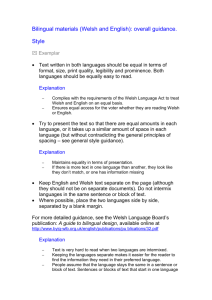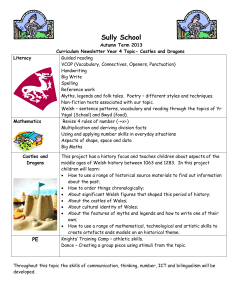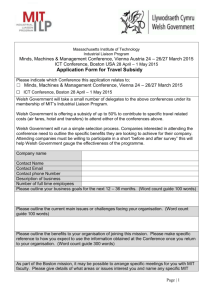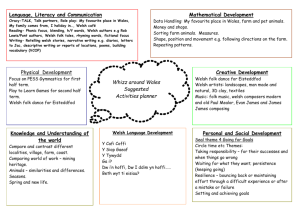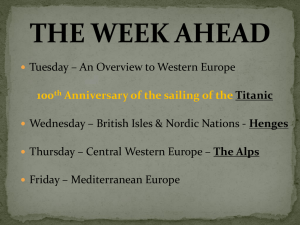Anna Louise Shato - University of Rio Grande
advertisement
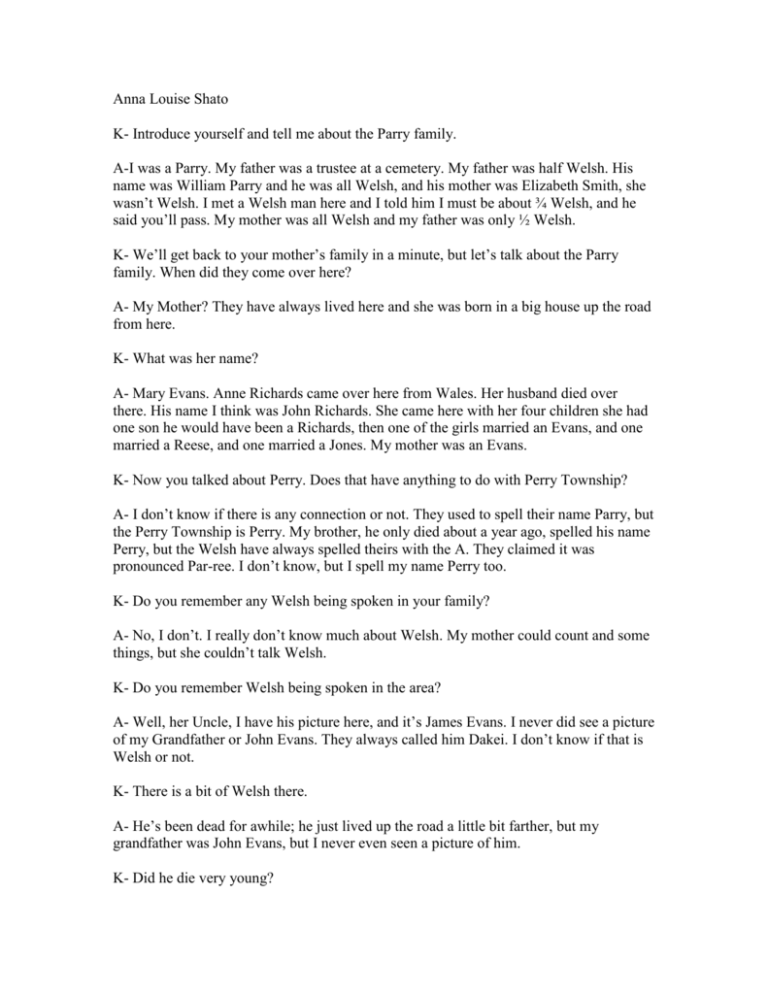
Anna Louise Shato K- Introduce yourself and tell me about the Parry family. A-I was a Parry. My father was a trustee at a cemetery. My father was half Welsh. His name was William Parry and he was all Welsh, and his mother was Elizabeth Smith, she wasn’t Welsh. I met a Welsh man here and I told him I must be about ¾ Welsh, and he said you’ll pass. My mother was all Welsh and my father was only ½ Welsh. K- We’ll get back to your mother’s family in a minute, but let’s talk about the Parry family. When did they come over here? A- My Mother? They have always lived here and she was born in a big house up the road from here. K- What was her name? A- Mary Evans. Anne Richards came over here from Wales. Her husband died over there. His name I think was John Richards. She came here with her four children she had one son he would have been a Richards, then one of the girls married an Evans, and one married a Reese, and one married a Jones. My mother was an Evans. K- Now you talked about Perry. Does that have anything to do with Perry Township? A- I don’t know if there is any connection or not. They used to spell their name Parry, but the Perry Township is Perry. My brother, he only died about a year ago, spelled his name Perry, but the Welsh have always spelled theirs with the A. They claimed it was pronounced Par-ree. I don’t know, but I spell my name Perry too. K- Do you remember any Welsh being spoken in your family? A- No, I don’t. I really don’t know much about Welsh. My mother could count and some things, but she couldn’t talk Welsh. K- Do you remember Welsh being spoken in the area? A- Well, her Uncle, I have his picture here, and it’s James Evans. I never did see a picture of my Grandfather or John Evans. They always called him Dakei. I don’t know if that is Welsh or not. K- There is a bit of Welsh there. A- He’s been dead for awhile; he just lived up the road a little bit farther, but my grandfather was John Evans, but I never even seen a picture of him. K- Did he die very young? A- I don’t know, but I think he did die young. My mother had two brothers that died. Stanley and the other was Johnny I think. I believe she said that the youngest one choked on a bread crumb or something. He was real young. K- Tell me about you. If you don’t mind me asking, when were you born? A-You’ll find out how old I am. I was born April 2, 1920. I am 83 years old. K- Goodness me I am surprised. A-I remember peoples birthdays real good. My son has two girls from his first marriage and two boys from his second. The girls call me all the time and their very nice, and the boys are too. Neither one of them are married. The oldest boy, William Poe is his name, they call him Roy, but he went to Marshall to school for four years, then the other one had a job logging and things, and they had to go to work so early. He was working at Athens, and he had to get up a four o’clock so they could get there in time to get a full days work, and a lot of them quit, so he’s not working right now. He is going to get another job. I am glad he give it up because it was hard work. He never did like going to school. The other one seems not to mind because he keeps going back to school. K- Have you always lived in this area? Have you always lived here? A-I was born in this room. Probably in that corner over there. I have spent all my life right here. K- What was it like growing up around here? A- That trailer over there really belongs to me, but the trailer was over there for quite a while and then they built that house right there. Oh, but the people that live in that house said “Oh we like to buy that, we like to have that land”, and my son said no we are not selling it. He said if we keep selling it here and there it will be gone, and he don’t want to sell it. I don’t know why they want to build up against it that way. K- Now your family, were they farmers? A-My dad was a farmer, and my husband worked for the state GSI, so I do get a pension from him., but he’s been dead for 21 years now. He died on the fourth of March in 1982. It was very sudden. He had a heart attack, and I didn’t know he had a problem with his heart, but I guess other people knew it. I worked out there building a fence with him that morning, and he came over here and said let me lay down for a bit. He wasn’t sick fifteen minutes until we had to call the emergency squad, and Miller’s wife now is a nurse, and she said he had another heart attack when he got in the parking lot, but I was sure he was dead when he left there. I thought he was dead, it lasted no time. K- Lets talk about the more happy side. When did you meet him, was he local. A-When did I meet him? We went to high school together, and he was in the navy. I went to see him when he was in Norfolk, Virginia. We had good times and bad times. K- Where did you go to high school? A- Rio Grande. K- What did you do when you left high school? A- I just stayed here in town. K- And worked on the farm. A-Yes, my father died, and my mother wanted me to stay here with her. He died very sudden. I was seventeen, and he and his cousin had an operation. They were expecting him home Saturday, and on Friday night he had a blood clot and died. I was seventeen and that liked to broke my heart. K- How did you cope? A- It was so unexpected A-yeah I went to Tyn Rose every Sunday until they closed that church and there was supposed to be a welsh meeting up there the last of this month. I haven’t heard just what it is but it is the last weekend and there are four churches that has that, but it is time for Tyn Rose to have it this time. K- Now when you were a little girl did they have services in Welsh at Tyn Rose? A-No, well sometimes they do have a Welsh preacher but most of the time he preaches in English because most of the people wouldn’t understand welsh. K- did many people go to Tyn Rose at one time. A-Not to many just the ones around here. There wasn’t a whole lot. K- Now you talked about the welsh meeting they are having at the end of the month Gemund vai. Did they used to have those a lot. A-I don’t know they used to it seemed like more people like to come to Tyn Rhos more than the other churches. Last year I went to oak hill and there were so few there and so many of them died off and were not interested and so on and so forth. I hope quite a few come. You know they serve a dinner cater style you know and that is why they give up that. K- What do you remember about the welsh not now, but when they were really active. A-I can’t exactly say but I just didn’t understand anything they said and I never did hear them talk welsh. Can you talk welsh. K- Yes. A-I expect you could. I know they teach that now at Rio Grande. K- Well what about Tyn Rhos church and the grave yard I am sure there are some stories that I don’t know about. A-Well I got this book that will explain an awful lot about it to you. K-Well why don’t you tell me more things that might not be in the book. I interviewed Evan Davis and he told me a couple of ghost stories. That I haven’t heard. So do you have any stories like that? A-No not really. No this is a picture of me on the end and I am the only one living in that bunch. There’s my name there, and this is Paul Schafer and that’s me, and the rest of them are dead and buried at Tyn Rhos. Theres Lawrence Lloyd and Edwin Thomas, and Katherine Evans and me. K- Now Eta suggested to me that there was a bit of a fall out about who would be buried at Tyn Rhos a long time ago. From what other people tell me the Welsh stepped together a lot. Did they step together a lot? A-I think so but anymore anybody can get a plot because the enlarged that cemetery. I was awful disappointed. I thought we would go straight out from that hill. I don’t they could ever get enough dirt to make it level. My husband is buried in the old part, it’s still level there, and so is my parents. My brother was buried there recently. I just had one brother. He lived at Athens, and his wife is still living. I don’t know what you’ll think about this, but she said she’s going to be cremated. K- Personally I don’t want to be cremated. I want to be buried. A- She said she had her arrangements made. She was a Thorne Ruth Thorne, and a lot of her people was, and she had a sister Edna and her husband always played golf in Florida after he retired, and when he died he had his ashes sprinkled on the golf course. Her sister Edna is the only one living besides her, and she wants to be cremated. So that is why I think Ruth wants to be cremated too. K- Well I am interested very much in Tyn Rhos chapel. Now probably think things are quite insignificant, but to me I don’t know very much about the church. I have a copy of this at the center, and I will read it. Do you have any memories about Tyn Rhos? A-Not a whole lot but I know that the church was there, and I always went there. K- Was it a big part of the community? A-I think so. It is just a very nice church, and it was open every Sunday. K-Did mostly Welsh people go there? A-Yes mostly Welsh. There is a old time church on 325 where the English always go. Have you ever heard of it. K-No I haven’t. So was there a divide between the English and the Welsh? A-I don’t know but I know they don’t have church at old time anymore. There are so few left that part of them went to Rio Grande and the rest went different places. K- Now obviously you are a good Welsh woman. You look like a Welsh lady. So how does being Welsh make you different perhaps? What characteristics do you have that makes you think of Welsh. A-I don’t know really. I could see where they would be different from anybody that was not Welsh. It seems like some people think the Welsh are not as good as them or something it seems to me like. I can’t see much difference myself. K- So some people look down on the Welsh. Around here? A-No I haven’t seen any of it. I just try to get along with everybody and get along good. I do wish that Evelyn Cookhart could have some Welsh in her. She is so interested in the Welsh. K- What about some characters in the area. Maybe some preachers or singers that were Welsh. A-They usually had singers that were Welsh. K- Is there anyone in the area that you remember? A-He just died recently, but Roger Williams he could sing Welsh just real good. K- What do you remember about him? A-He hasn’t been dead very long and his sister, Harvey Thomas, always played the piano. She could play anything, and she taught music, and she played piano and he sang. My second daughter lived in Thurmon for a while, and she would go to the post office, and she said that Roger would come in whistling and singing Welsh in the post office. She knew it was Welsh. K-Are there any other people like Roger that you remember. A-Well I don’t know of anyone who sang Welsh other than Roger. There were some that would sing but I don’t know where they were from. K- Is there anything you would like to add about the Welsh that you remember? A-There were a lot of women that knew Welsh. You could hear them sing right along with it. I don’t know how they knew it, but the women would sing on this verse. They just sang right along. K- Is there anything you would like to put on the tape that you think might be interested in about the Welsh? Information that only someone who lived around here would know. A-I don’t know of anybody. There just isn’t many Welsh around here anymore. K- Did a lot of them move away? A-Some died. You don’t run into people my age much anymore. I seem to have good health. I went to the doctor two or three weeks ago, and I am not supposed to go back for four weeks. I got a good report, and my blood pressure was good, and he told me everything was fine. They said everything was okay but you never know. K- It sounds good. This will probably be my last question if I can’t think of anything else. Do you have any letters? Did your family when they moved over here keep in touch with folks from Wales. A-Relatives. No I don’t have anyone from Wales. K- Did your family keep in touch with anyone from Wales? A-No I don’t thinks so. If you talk to Evan Davis his wife is from Wales. K- Do you have any old photographs of your family? A-Now his oldest boy got married. K- That’s right A-He wanted to have a big church wedding. My granddaughter met his wife she said she was real nice, but she said they didn’t want to have no big wedding. K- Their a really big Welsh family aren’t they. A-He would be. I don’t think she is. K- I think she was a Louis. The Davis’ have contributed a lot to the area. Especially in the Oak Hill area haven’t they. A-D.D. Davis was kind of the head of that cemetery and had it all fixed up the way it was and he was relation to the Evans his mother was an Evans, and he was first cousins with my mother. K- So what was the church like before they took over? A-The church was ok but it only had regular wooden siding, and my husband suggested that they had to paint it to put on vinyl siding so that’s why they fixed it so that way they didn’t have to paint it as often. K- Now I heard a story I don’t know if you’ve heard it, and Evelyn told me about it that at Tyn Rhos cemetery there is a lady buried there called Elizabeth Davis and many of her children died from black diphtheria. A-Yeah I heard that. K- What’s the story? A-I don’t really know. The only monuments are on the front row. I heard of diphtheria or something like that. K- Did you hear that the house was burned? A-I never heard much about it. I just know that was what was wrong. From beginning to here was typed up by Seth 1-24 A- Now, my lot is clear right in the far part back of the old cemetery and there’s a driveway, kind of, that goes in front of it. But there’s a few graves in between the driveway, but it’s pretty much towards the back. K- Now, you’ve seen the Welsh culture in this area over a very long period of time. Would you…how would you describe the Welsh activity today? Are people aware of their heritage? You obviously know about your family and where they came from. Do you think other people today are like that? A- Well, I don’t know (?) where they really do come from, for other people. The time that my father died there was someone died in five houses down the road. Every house, there was…my aunt, and then my uncle, he’s a Jenkins, and then my dad and then there was a White, he was English, John White. He was pretty old. He died. I don’t know…they said there was five. I can’t…I can only name four. Just all in a row. In the same year. I remember that. K- Well, we’re going to have a look through here and just see if there’s anything you want to point out to ( ?), perhaps any pictures perhaps important to you. A-Well, I took this (?), here. Now, my father was…now, that’s Da-cu, there… K- That’s Da-cu? A-Is that James Evans? K- It is. A-Yeah, that was my grandpa’s brother, and then there’s a Richards there by him. K- David C. Richards. A- David C. Richard. And then, there’s a William Perry in that one? K- William D. Perry. A- That’s my father. He died in ’37. K- Do you have any memories of them? A- Oh, yes. He was an awfully nice man… K- Your father? A- Oh, my. He was so good to me, and it’s just like to broke my heart when he died. He died rather sudden and unexpected, so. K- And he was one of the original trustees of Tyn Rhos? A- Yes. K- So he was very involved? A- Yes. All of them are dead. You see, D.D. Davis, he’s in the middle there, and then there’s Arthur Jenkins and Edwin Thomas. They’re all dead and buried up there. K- Is there anything else in here that you want to talk about? Any other pictures? A- There’s a lot of churches…picture that…have you got this book? K- Yes. I haven’t looked in it for a long time. A- I say you could take this book, if you want to. And I’ve got two of these just alike, and I don’t know…There’s pictures of Tyn Rhos and a lot of churches. You can keep one of them. K- Oh, that’s wonderful. Thank you. A- I have two of them, just alike. K- That’s wonderful. Did you go to many of these other churches? Horeb…? A- ( Up in ? . ? ? ??) these pictures. But, I don’t know who this other man is. Some preacher, I suppose. K- Now, do you remember D.D.? A- Yes. K- What was he like? A- Well, he’s all business. He was at the brick yards in Oak Hill. He was real well-to-do, and he had a sister who kept the house, Margaret, and then, well, they was all connected with the brick yards. There’s only one got married in that family. That was Ifan (?), I believe. And then, after his wife died he remarried and he’s buried right in the corner there, in front of that log house, and this last woman he married, his first wife is on one side and she had him buried on the other side, next to her. K- Now, is that Evan Davis’ parents? A- No. His parents are in the mausoleum in Oak Hill. End of side one. K- This is side two of the Anna Louise Shato interview. A- You can keep that. K- That’s wonderful. A- I was wondering who that other preacher was. Who is that? K- That is Reverend John (Tyfnal?) Williams, born in (Carwyn?), North Wales, September 7, 1880, died in Cincinnati, Ohio in 1950. A- I didn’t know who that one was. K- What about the Welsh museum? What do you think of that? A- It was a lot of things in it. You ever been in there? Yeah. K- They do have a lot of things. A-Have you ever been in that Welsh church, I mean that log church? K- When? A- (mumble). See I gave them a picture that’s on the wall up there. I forget where it was, now. I forget. It was a Welsh picture. I know they put it on the wall. You’d think K- Well, is there anything else? Did you ever go to an Eisteddfod at Rio Grande? Did you ever hear about that? A- About what? K- An Eisteddfod. A- No. I never went to anything like that. K- Well, is there anything else you want to tell me about you or the Welsh heritage, or Tyn Rhos? A- I can’t think of anything. K-Okay. Well, I really appreciate talking to you. You might not think this is important, but it really, really is, and for me to have better understanding of the Welsh and hopefully in a hundred years time for other people to look back and see what was going on in this area. So, thank you very much. A- You’re welcome. K- I really appreciate it. This is the end of the interview. A- Oh, is it?

